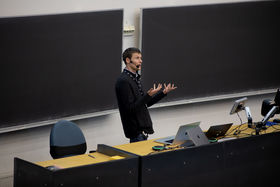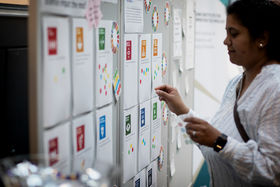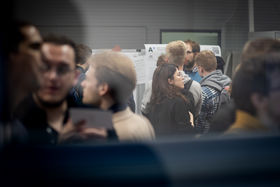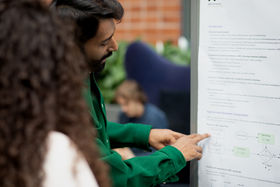CS Research Day 2022

When
Event language(s)
This year CS Research Day will be arranged on Thursday 6 October. If you have ever wondered what all your colleagues are up to, this is your chance to find out!
The day starts at 14:00 at lecture hall T1 with interesting talks by some of our newest professors. After the joint seminar you can circle in poster and demo sessions or visit short presentations and get to know more about our research groups and service staff.
| Program | |
|---|---|
| 14:00:15:00 |
Opening of the eventAssociate Professor Janne Lindqvist |
Modelling Mental Rotation for Deep LearningAssistant Professor Stephane Deny Mental rotation is the process by which humans are able to recognize objects in unusual poses. Deep networks lack this ability, and as a consequence are less robust than the human visual system. In this talk I will describe ongoing work to understand how the human brain performs mental rotation in order to implement a similar process in deep learning. |
|
Temporal Networks for Business and PleasureProfessor Petter Holme Temporal networks are extensions of graphs to situations where we know not only who is in contact with whom but also when the contacts happen. Data from social media, human mobility, and phone calls can all be represented as temporal networks. I will present how this paradigm is transforming our understanding of disease and information spreading and its promises and challenges for the future. |
|
Geometric Algorithms and Computational LimitsAssistant Professor Sandor Kisfaludi-Bak Computer graphics, computer aided manufacturing, geographic information systems, integrated circuit design, and many other fields use geometric algorithms to reach their goals. Typically, the problems solved by these algorithms are about manipulating or computing the relationship of certain objects in low-dimensional spaces. The age-old question in theoretical computer science is to find the most efficient algorithm for each task. Can we find the most efficient algorithms for geometric tasks? What type of evidence can we offer that the efficiency of a given geometric algorithm cannot be improved further? |
|
Tight Proof of Sequential Work from LatticesAssistant Professor Russell Lai Imagine that you have discovered a proof x of a famous conjecture, e.g. the P v.s. NP problem, at time t and are about to publish the proof. However, academic publication takes time and a competitor who later discovers an alternative proof might get all the credits if they manage to publish their proof first. To prevent this, you decide to timestamp your proof x by performing a moderately hard computation f(x) starting at time t. If the computation f(x) requires time T, by publishing the proof x and the computation result f(x) at time t+T, everyone will be convinced that you have discovered the proof T units time in the past. A proof of sequential work (PoSW) scheme can be thought of as a special moderately hard computation f where verifying that y = f(x) given (x,y) can be done in much less time than computing f(x). In this talk, I will present to you a new construction of post-quantum-secure PoSW whose sequentiality is based on conjectured hard problems over lattices. |
|
Quantum Computers, Or: don’t let your qubits grow up to be cowboysAssistant Professor Alexandru Paler Building the software for large-scale quantum computers is a highly exciting and interdisciplinary challenge involving research of computer engineering, machine learning and theoretical computer science. We list some of the challenges tackled by the Quantum Software and Algorithms group. |
|
Closing wordsAssociate Professor Janne Lindqvist |
|
| 15:00-16:00 | Posters & demos (CS building library, Lecture room T5) Short presentations (Lecture room T6) |
The point of the CS Research Day is networking and getting to know what other CS researchers are doing. We hope to see as many of you as possible there! Looking forward to a lively event!










